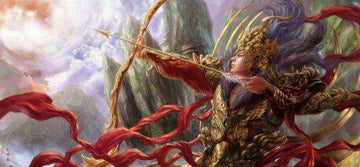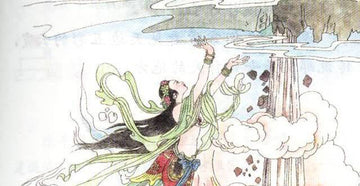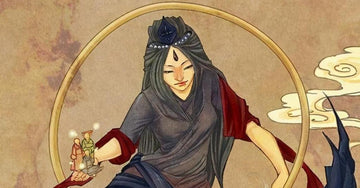Nüwa (女媧) is a prominent figure in Chinese mythology, revered as a goddess of creation, fertility, and humanity. She is one of the most ancient and important deities in Chinese mythology, associated with the creation of human beings and the maintenance of social order.
Origins and Legends
Nüwa is believed to have been born during the reign of Emperor Fuxi, a legendary ruler of ancient China. She is often depicted as a serpent or dragon, and some legends suggest that she had a human form with a serpent's tail.
According to Chinese mythology, the world was once in chaos and without form until Nüwa came along. She is credited with creating human beings by shaping them out of yellow clay. She is also believed to have repaired the damaged pillars that supported the sky, which had been damaged during a great battle between the gods.
Another legend involving Nüwa tells of a time when the world was filled with floods and other natural disasters. Nüwa created a magical stone called the "five-colored stone" which she used to patch up the broken sky, thus preventing the world from being destroyed.
In addition to her role in creating and maintaining order in the world, Nüwa is also associated with fertility and marriage. She is said to have created the first marriage by tying a red cord around the ankles of a man and a woman, thereby uniting them in matrimony.
Worship and Legacy
Nüwa has been revered in China for thousands of years, and she remains an important figure in Chinese mythology and culture today. In ancient times, she was often worshipped as a fertility goddess, and she was believed to bring good luck and prosperity to those who prayed to her.
Today, Nüwa is often associated with the Chinese zodiac sign of the snake, and she is sometimes depicted in artwork and popular culture as a serpent or dragon. Many Chinese people still pay tribute to her at temples and shrines throughout the country, offering prayers and sacrifices in the hopes of gaining her favor.
In addition to her religious significance, Nüwa also holds an important place in Chinese literature and art. She has been the subject of numerous poems, songs, and stories over the centuries, and she continues to inspire artists and writers to this day.
Conclusion
Nüwa is a fascinating and complex figure in Chinese mythology, revered as a goddess of creation, fertility, and humanity. Her legends and stories have been passed down through the ages, and she remains an important figure in Chinese culture and religion today. Whether she is seen as a serpent, a dragon, or a human being with a serpent's tail, Nüwa's legacy endures, inspiring generations of Chinese people to honor and revere her as one of the most important and beloved deities in their mythology.




